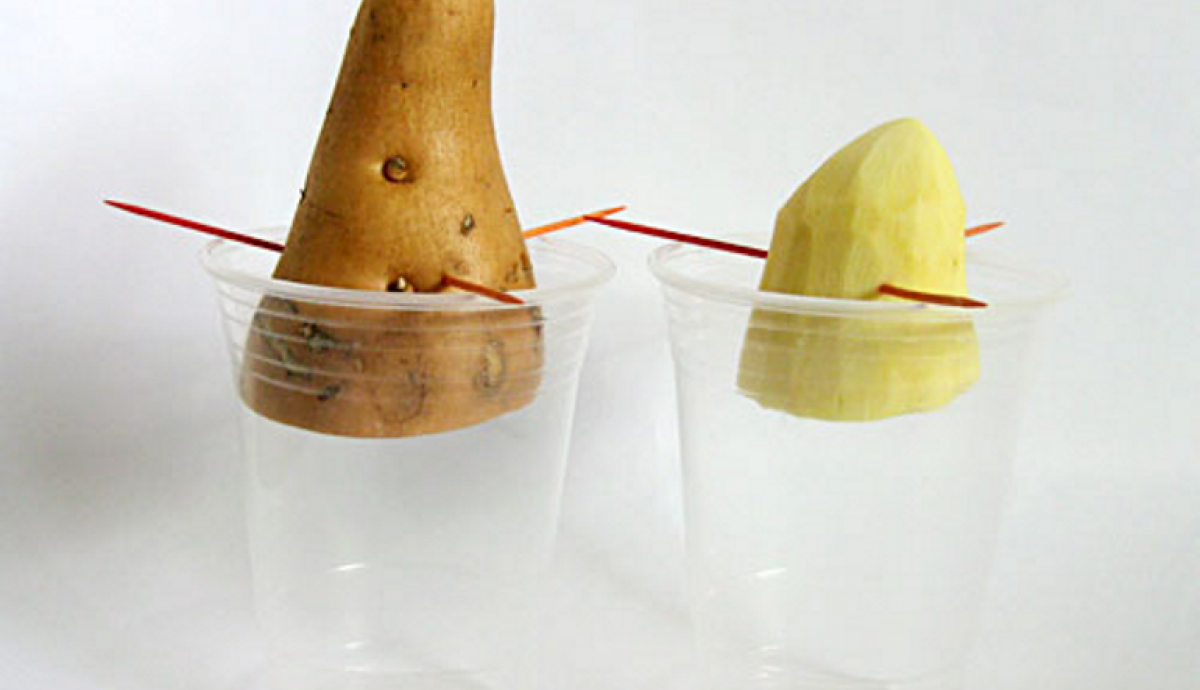Get Started on a "Growing" Science Project
The school year may be coming to an end, but for students wanting to experiment with agriculture-, plant- or food-related science, summer can be a great time to start thinking about next year's science project. Guest writer, Amy Cowen from Science Buddies gives us some tips!

Some science projects take planning—and time to grow. Find out how to streamline your science project and stay on track from start to finish.
Amy Cowen, Science Buddies
The school year may be coming to an end, but for students wanting to experiment with agriculture-, plant- or food-related science, summer can be a great time to start thinking about next year's science project. Not every science project can be completed in a few hours or even in a few days. Some STEM projects require that students observe and gather data over a span of time. Projects involving plant growth, for example, require extra time and planning. Plants take time to grow!
Pick a Project You Love
Finding a project of interest is a key factor in enjoying the student science project experience. Luckily, there are thousands of free scientist-authored project ideas at Science Buddies. Many of these projects provide a step-by-step experimental procedure. Or students can use a project idea as a launch pad for a custom exploration. Variations included with each project help suggest ways students can customize the science project to experiment with different materials, explore different variables, or look at a related but different angle to a science question.
Stay on Track
When starting a science project, following the steps of the Scientific Method can help you plan your project and keep on track. For projects that may take weeks or months, having a plan and sticking to a schedule is very important.
Here are some key steps to take to help ensure your project goes smoothly:
- Summarize your project: have a clear view of your project and your science question.
- Do your background research: background reading helps you better understand what you will be seeing, observing, and testing during your experiment.
- Write your hypothesis: your hypothesis should be written at the beginning of the project planning. Your experiment, observations, and data analysis will either support or not support your hypothesis. The goal is not to be right. The goal is to have a clear and testable hypothesis in place and then do an experiment to see what happens.
- Identify your variables: be sure you understand what your variables are, what variable you will be changing (the independent variable), and what variable you will be watching to see if there is any change (the dependent variable).
- Plan your procedure and experimental setup: determine the steps of your experiment. If it will be a lengthy experiment, make a schedule that helps you plot the steps of the experiment on a timeline. Be sure to allow room for any unexpected problems that may arise.
- Make a list of materials: after deciding on the procedure for your project, make a complete list of materials needed so that everything can be ordered or purchased in advance of starting the project. (Be sure to factor in delivery time when scheduling your project and placing orders!)
- Get a lab notebook: keeping a lab notebook where you record all aspects of your project is important for any science project, but it is especially important for a project that will stretch over weeks or months. Write down everything. Write down every observation you make. Record every change you make to your variables. Record what you observe. If problems arise, write them down. All of this information will be helpful later when you analyze your data, explain your findings, and write your conclusion. If your project involves growing things, it may also be important for you to track weather conditions. Be diligent about your recordkeeping!
- Take photos: throughout your experiment, take photos. These can be helpful later for comparing certain stages of the project, and they can be used on your project display board. (Making relevant sketches and diagrams in your lab notebook is also good practice and can help you record important information during your experiment.)
- Stick with the project: a lengthy project means you have to be committed to doing certain steps, making observations, and logging data in your lab notebook until it is finished. Be sure if you plan a long-term project that you are interested in the topic enough to see it all the way through!
For a full list of steps for a student science project, see the Science Buddies Project Guide

Find a Great Science Project
The following science projects may be of particular interest to students interested in agriculture, plant science, and food science:
Long-term ag related science projects:
- Bacteria Can Fix It! A Comparison of Nitrogen-Fixing Bacteria and Nitrogen Fertilizers
- Do Oranges Lose or Gain Vitamin C After Being Picked?
- Earthworm Castings — The Ideal Proportion in Soil for Young Garden Plants
- Eggs and Hen's Diet: Can You Get Bigger Eggs for Peanuts?
- Feeding Earthworms: Do Different Diets Affect Them and the Soil They Enrich?
- Go Green by Growing Green: How to Extract Energy from Grass
- Growing a Soil Menagerie
- Growing Great Gardens: Using Human Urine as a Fertilizer
- Growing, Growing, Gone! An Experiment on Nitrogen Fertilizers
- Harmful or Helpful? The Effects of Hydrogen Peroxide on the Roots of Plant Cuttings & on Seed Germination
- Home Sweet Biome: How Do Plants Grow in Different Environments?
- How Do Roots Grow When the Direction of Gravity Changes?
- Propagate Plants Without Using Seeds!
- Rad Radishes: Effects of Irradiation on Seed Germination
- Hydroponics: Gardening Without Soil
- Plants on the Move! Experiments with Phototropism
- Recycling Greywater: Can Plants Tolerate It?
- Sprouting Sweet Potatoes Slips
Short ag related science projects:
- Can Aloe Juice Save Your Berries from Mold?
- Investigate the Vitamin C Level in Bell Peppers During Various Stages of Ripeness
- Dust Busters: How No-Plow Farmers Try to Save Our Soil
- Earthworms: Nature's Tiller?
- From Bitter to Sweet: How Sugar Content Changes in Ripening Fruit
- Gone with the Wind: An Experiment on Seed & Fruit Dispersal
- How Does Soil Affect the pH of Water?
- How Many Seeds Do Different Types of Fruit Produce?
- Plants Are On the Move! A Study of Gravitropism
- Rooftop Gardens: Are They a Cool Idea?
Talk to Your Teacher
It is always recommended that you talk with your teacher before starting a long-term science project. Your teacher may have specific requirements for your school science project, and you want to be sure you have approval before you begin.
Science Buddies has more than 1,100 free project ideas and activities for K-12 students in more than 30 areas of science, technology, engineering, and math (STEM). In addition to browsing the directory of Project Ideas, the Topic Selection Wizard can help students find projects of interest.
Want even more science experiment fun? Check out these experiments with cookie ingredients! Science was never so tasty!









